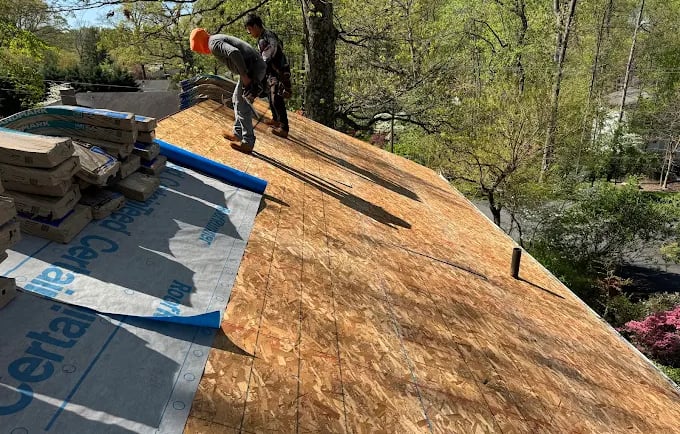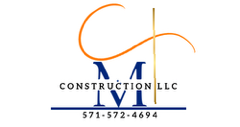Types of Residential Roofing Shingles in Virginia: Pros, Cons, and What to Know
When it's time to replace your roof, choosing the right type of shingle can feel overwhelming. Asphalt, wood, metal, slate—the options all come with their own price points, styles, and levels of durability.
Page One Insights, LLC
6/11/20253 min read


Types of Residential Roofing Shingles in Virginia: Pros, Cons, and What to Know
When it's time to replace your roof, choosing the right type of shingle can feel overwhelming. Asphalt, wood, metal, slate—the options all come with their own price points, styles, and levels of durability.
In Virginia, your roofing choice is more than just a curb appeal decision. From humid summers to salty coastal air to strong coastal storms, the state’s climate presents a wide range of challenges for your roof to endure—especially near places like the Occoquan Bay.
So, how do you know what shingle is right for your home? Let’s break down the most common types of residential shingles used in Virginia, and look at the pros and cons of each.
1. Asphalt Shingles (3-Tab and Architectural)
Asphalt shingles are easily the most popular roofing material across the country—and Virginia is no exception. They’re widely available, relatively affordable, and come in a variety of styles.
3-Tab Asphalt Shingles
These are the most basic, budget-friendly shingles. They're flat, lightweight, and have a uniform appearance.
Pros:
✔️ Affordable
✔️ Easy to install
✔️ Readily availableCons:
❌ Shorter lifespan (12–20 years)
❌ More prone to wind damage in coastal storms
❌ Less dimension and visual appeal
Architectural (Dimensional) Shingles
These are thicker and layered to give a more high-end look. They’re also more durable than their 3-tab cousins.
Pros:
✔️ Better wind and weather resistance
✔️ Longer lifespan (20–30 years)
✔️ More visual depth and curb appealCons:
❌ Slightly more expensive
❌ Heavier, which may require reinforcement on older homes
Best for: Homeowners looking for a balance between durability and cost, especially in storm-prone areas like coastal Virginia.
2. Metal Roofing Shingles
Metal roofing has come a long way in recent years. You no longer have to settle for barn-style panels—today’s metal shingles can mimic the look of slate, tile, or even wood.
Pros:
✔️ Excellent durability (40–70 years)
✔️ Fire resistant and energy efficient
✔️ Stands up well to wind, hail, and coastal salt exposureCons:
❌ Higher upfront cost
❌ Can be noisier during rain or hail (though underlayment helps)
❌ Not ideal for flatter roof pitches
Best for: Homes in high-wind zones or along the coast (like the Occoquan Bay area), where longevity and storm resistance are key.
3. Wood Shingles and Shakes
Wood shingles offer a natural, timeless look that blends beautifully in Virginia’s historic and rural areas. Shakes are hand-split and have a more rustic, textured appearance, while shingles are machine-cut for uniformity.
Pros:
✔️ Beautiful, natural appearance
✔️ Good insulation properties
✔️ Can last 25–30 years with proper maintenanceCons:
❌ Prone to mold, rot, and insect damage in humid climates
❌ Higher maintenance requirements
❌ Fire risk unless specially treated
Best for: Homeowners who prioritize aesthetics and live further inland, where humidity and fire risks are more manageable.
4. Slate Shingles
Slate is one of the most durable and visually impressive roofing materials on the market. It’s also one of the heaviest and most expensive. Still, for historic or luxury homes, nothing else quite compares.
Pros:
✔️ Extremely long lifespan (75–100+ years)
✔️ Resistant to fire, wind, and weather
✔️ Natural, high-end appearanceCons:
❌ Very heavy—requires reinforced roof structure
❌ Expensive to install and repair
❌ Not ideal for every budget or every home
Best for: High-end homes or restorations in Virginia’s historic districts—especially when the budget and structural support allow for it.
5. Synthetic or Composite Shingles
These shingles are made from recycled rubber, plastics, or polymers and are designed to mimic the look of slate, wood, or shake—without the weight or maintenance.
Pros:
✔️ Lightweight and easy to install
✔️ Mold and mildew resistant
✔️ Often wind- and fire-rated for added safety
✔️ Durable (30–50 years lifespan)Cons:
❌ Newer product category—less long-term data
❌ Costs vary depending on brand and style
❌ May fade in harsh UV over time
Best for: Coastal Virginia homeowners who want durability and style without committing to a heavy or high-maintenance material.
So… What’s the Best Roofing Shingle for Virginia Homes?
There’s no one-size-fits-all answer, but here are a few quick tips based on the climate and architecture in Virginia:
Along the coast? Choose metal or architectural asphalt shingles for wind, salt, and moisture resistance.
On a budget? Stick with 3-tab asphalt, but plan to replace them more frequently.
Want long-term value? Synthetic and slate shingles offer exceptional lifespan and weather resistance.
Live in a historic area? Wood or slate shingles may be preferred—or even required by HOA rules.
And don’t forget: underlayment, attic ventilation, and proper installation are just as important as the shingles you choose.
Need Help Deciding What’s Right for Your Home?
At MT Construction, LLC, we’ve worked on homes all across Northern Virginia—from historic properties to brand-new builds. We specialize in helping homeowners choose roofing materials that are right for their specific needs, their home’s design, and their location—especially here along the coast of the Occoquan Bay.
We offer:
Free roof inspections
Honest, detailed estimates
Insurance claim support for storm damage
Full roof replacements with high-quality materials tailored to Virginia’s climate
📞 Call us today at (571) 572-4694 or email info@mtconstructionllc.com to schedule your consultation and explore your roofing options with a team that knows Virginia homes inside and out.
Info@MTConstructionllc.com
(571)572-4694
© 2025. All rights reserved.


